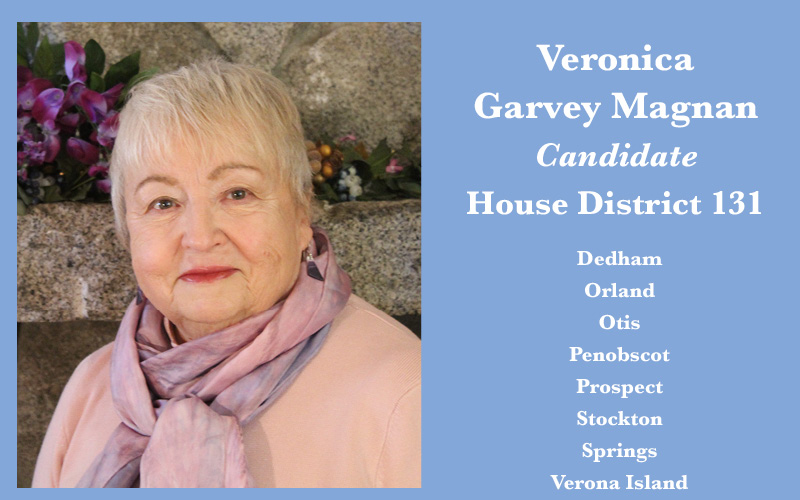On the issues: House District 131 Candidate Veronica Garvey Magnan
Penobscot Bay Pilot has posed questions to each candidate running for Maine State Legislature, providing the opportunity for the public to better understand their position on issues important to the state. Candidates responding with their individual written answers will have their responses stored in the Pilot’s 2020 Election Resource Guide. Veronica Garvey Magnan, Democrat, seeks to represent Maine House District 131, which includes Dedham, Orland, Otis, Penobscot, Prospect, Stockton Springs and Verona Island.
1. Please provide a concise biography of yourself.
I am a retired educator and community volunteer. I was a teacher, principal, superintendent of schools and school board director I have served in both cities and rural areas. As a community volunteer, I am presently Chair of the Church Committee of the Sandy Point Congregational Church, on the Board of Directors of the Maine Ocean School Foundation and a board member of the Sandy Point Community Club. Over the years I volunteered with many local groups. I served in the 124th Legislature. And I am presently running for House District 131.
I have been married for 45 years to Roland Magnan. We have two children and four grandchildren. We spend the summer on Toddy Pond in Orland and enjoy camping, fishing, boating and travel. I do photography and art. For a more complete biography see my website and friend me on Facebook at Veronica Magnan Candidate District 131. I have a life-style, political and travel blog on my website veronicamagnan.com.
2. What are the three most pressing issues facing Maine, as a state, today, and how would you like to see them resolved?
a. Broadband: Broadband and the lack of extensive, comprehensive and fast coverage of rural areas is crushing our economic recovery in Maine. One of the most glaring shortcomings of doing business, education and community action during the pandemic has been lack of reliable Broadband. Rural Maine will not recover at the same rate as urban areas without immediate action to cover the state.
There is a plan in place, it was called the Three Ring Binder, years ago when the issue first came up. But now there is a five-year plan to expand services to rural areas. I don’t believe we have five years to make this transition.
We, the Legislature, need to bring all parties back to the table and hammer out a faster, cheaper and more efficient way to expand Broadband to our people within two years. It may be time to reconsider the principals in the deal that is on the table. There may be new players who are willing to make deals now, so that our small businesses and students can be served at a reasonable cost. Five years is too long. Legislation to get this process going needs to be ready for day one. I would introduce legislation to get the Five Year Internet Expansion under reconsideration and reorganization.
b. Micro-business Survival: There are no big businesses and few, by federal definitions, small businesses in District 131. The area is very big and scenic and the population is small. Most of our workers commute to Bangor, Ellsworth, Bar Harbor, Belfast and beyond for jobs. The remainder are farmers, fishermen, trade, craft and service businesses that are often too small to apply for federal and state grants and loans. This became more evident and disturbing during the COVID economic crisis.
The recent distribution of federal funds to the nation’s biggest and strongest businesses will help them to survive. If we have another round of grants and loans, however, they must be given to micro-business people who are far more reliant on a weekly or monthly schedule and every cent they get will be recirculated through the local economy. The Legislature must set up a bureau for the service of providing low or no-cost loans and grants to those micro-businesses.
This could come as a grant or loan program using the monies sent to the state by the federal government. There are historical precedents for working for and on behalf of very small entrepreneurs and sustaining them during this present crisis. There is enough money in the “Richest Nation in the World” to support their efforts and continuation.
A reexamination of the military budget would be a way to “free-up” money for several highly necessary programs and this one should be a priority. Demanding that the states, whose own income has taken a major hit, be totally responsible for the success of the whole state and all its residents, is absurd.
A repeal of the past two major “tax breaks” for the wealthy would also be a decent start for refunding both the state and national governments. Rolling back tax cuts for those earning over $200,000 would be a start. As the Great Depression came on the back of the early 20th century tax cuts and they had to be repealed to get the economy going again, this is a very real way of stimulating the economy and restoring a sense of economic justice to the country.
c. A Big Economic Recovery Plan: It is time to combine the issues of Climate Change, Renewable Energy and Manufacturing into a comprehensive economic recovery plan.
Climate Change is a looming threat to our coastal economies. Using the models generated by the Benelux countries in Europe and our own R&D facilities at local universities, we must start to prepare for flooding of many coastal, estuarine, and riverside cities. Our so-called 100 Year storms and floods seem to be coming less then five years apart lately. If we add to this our need for affordable, renewable, locally generated energy, we have another piece of our economic puzzle.
And we might be able to address both those issues and the need for good solid manufacturing jobs by creating a plan to weave the pending need to address climate change, energy generation and manufacturing into a process that can be moved along with the help of the Legislature.
I know there are committees and commissions working on all of the above pieces, but it is time to move them forward together. I am not speaking about some crazy communist economic plan, but one that integrates local needs with the innovative economies to produce reliable and workable outcomes.
It is essential that local select boards and city councils determine what would be best for their own communities and be willing to work toward solutions. For instance, there is a need for protecting our coastlines. While driving along the coast, even on the Loop Road in Acadia National Park, you can see berms built to hold back the bold tides and to preserve the roadways and even homes and businesses. There is a way to use the barriers and tidal flow to create energy for the areas in distress.
Tying together the force of the water, the need to protect the environment, and the generation of energy is a win-win-win. If we add to this the manufacturing of components as designed and developed by out outstanding Research and Development facilities at UMO’s Engineering program and then the production of such devices in local manufacturing plants.
We can make addressing three big issues into a workable solution. This will require collaboration among the universities and business worlds, but they can meet a looming challenge. Therefore, there is a need to introduce a bill to create a working commission which will collaborate and coordinate the needs and the outcomes of the problems listed above. They would have to see the big picture and include Legislators, local political figures, business people and academic resources. This process needs to start as soon as possible. The local entities could use this challenge as they work on revising their local comprehensive plans.
All of the situations listed above are critical to the future of Maine’s economy going forward. It is also time for federal to state revenue sharing to be realistic and abundant. The Governor, with the support of her Legislature could make the case, however forceful, to the national government to step up.
3. How will you protect the local (municipal) taxpayer as you help shape a state budget?
The most important thing that the Legislature can do is support education to the level decided over a decade ago, 55% state and 45% local funding. This has seemed to be a “wish” not a plan. It is time for the state to do this funding to the fullest. The COVID economy has stifled local income. Businesses of all sizes have shut down or lost income. They are having problems paying their taxes. The municipalities are wondering how they can afford to pay and keep essential services going. But education is one of the duties and obligations of the towns as well as the state, so money must be found for this effort. I will support all efforts to fund education to the full amount of the state mandate.
4. Given the shortfall of housing in your district, how should the state approach the need for more workforce housing, as well as re-entry housing for the formerly incarcerated, and emergency shelter for those suffering through extended power outages?
While these are important issues, they do not pertain to District 131 in the same way they do to a city or very large town. This is especially true in the large cities in southern Maine. District 131’s biggest challenge of the issues above is keeping the electricity flowing and restored after storms and power outages. The solution is part of a greater shift from delivered power to locally created power. That is a big issue and is covered in several of these answers.
5. What legislative committees would you like to serve on and why?
As a lifelong educator I would like to serve on the Education and Cultural Affairs Committee. But I am flexible and served on the Criminal Justice and Public Safety Committee in the 124th Legislature. I enjoyed serving on that Committee very much. But for a second selection, it would be effective on the Innovation, Development, Economic Advancement and Business Committee.
6. Maine’s economy relies on small and micro-businesses. How will you help the entrepreneur succeed in this state, especially given the pandemic?
Since I explained that House District 131 is a very rural district with mostly micro-businesses, I have addressed most of the issues raised in this question under the topic Micro-Business Survival.
7. What is your vision for affordable health care?
One of the ways that small and micro-businesses are choked in their efforts to grow is that having reliable and permanent workers is expensive. One of the greatest expenses for employers is to provide some kind of medical coverage to full-time (40 hours) workers. Often the coverage available and affordable to the employer is inadequate to supporting the medical needs of a worker or their families. The “deductible” amount that either or both of the parties must pay is often so high that it can be ridiculous to any but amazingly healthy families.
The “real” solution is Single Payer Healthcare. The greatest shame is that the right has made this an issue of being un-American and Socialistic. This is a false deduction. All of the major First World economies have Healthcare for all. It can be done. If all the money that goes into the healthcare industry middle-people and carrying charges as well as both employee and employer contributions went into a non-profit structure, Medicare for example, then there would be enough to fund the program. Initially there would be an influx of folks who have postponed much needed care, but after a very few years the field could deal with chronic and genetic problems and put a great deal of emphasis on personal health and healthy living. Again, this approach has been used successfully in Canada, Europe and other countries.
8. Does the State of Maine need to improve its public health system?
Judging from the response by Governor Mills and Dr. Shah, we are doing as well as we can in controlling the COVID virus spread. Individuals who refuse to comply, such as the attendees at the Millinocket wedding in August, run the risk of contaminating us all and bringing a much worse outcome than we have had initially.
As for the State public health system, it would seem to be the same victim as most highly necessary programs in Maine and America today, underfunded. With a reasonable infusion of federal funds, for the greater good, we could have all the physical and mental health needs met. When our Maine economy recovers, we could have extensive programs that are now out of the reach of funding, though still in great need.
9. What are the greatest strengths in your district, and how do you hope to support them?
The greatest strengths in District 131 are her small entrepreneurs. The micro-businesses that drive and support out local economies are essential to our rural “Maine the way life should be” slogan. I plan to contact the select people in each town within the next few weeks to ask them to consider whether or not they need me to introduce legislation on their behalf to the upcoming session. Most towns can manage their own affairs. This year will be different due to the reduction in revenues from the state and local taxes.
I have discussed the need to provide the tiny businesses with low or no-cost loans and outright grants. The PPE worked well for bigger businesses, but with only family and friends on the payroll, many micro-businesses were left out of that opportunity. The need for super extensive income reporting must be streamlined to allow the micro-businesses to compete with larger ones who have well established credit lines. The big banks that distributed the last round of loans from the COVID epidemic had to give the loans to current customers with good credit. The smaller the unit, the less likely they would be to get a loan. This needs to be revisited. We can help at the state level, we need some legislation to spur this on.
The recent amount of money to be sent from the federal government for the lobster industry will probably meet with the same problem. The larger or more successful the lobster fisherman, the greater the possibility they will receive funds. But what of those who do not meet the criteria? We shall see. The farmers and small crafts and trades people still need help and there does not appear to be any on the federal horizon. Advocating for them and seeing that they get something from the next federal infusion will be the charge of this next legislature.
10. What are the greatest problems to address in your district, and how do you intend to address them?
I believe I have addressed most of the problems of a rural House district in Maine at this time. Those of us in “the other Maine” north of Augusta have simpler problems than the large town, small and large cities. I would expect to be sensitive to the needs of fellow Mainers in more suburban and urban areas, but too often it is the rural areas that get left behind, and I am ready to fight for all we deserve.
11. What is your position on law enforcement reform in the State of Maine?
As the mother of a former Marine who is a policeman, I have no reason to support the “defund” the police movement if it is aimed at reducing the number of local and state police in Maine. I would like to see teams of psychiatric social workers, nurses and EMT’s in place in all counties of Maine able to respond in support of police action concerning domestic violence, mental illness breakdowns, hostage situations and other police issues involving deviant social and mental behaviors. When they also involve the use of guns by the assailants, we definitely need armed police who will have a sense of and understanding of what needs to be done to disarm the problem, or to act in a non-lethal way to solve the situation.
12. What are your thoughts about the state’s response to the pandemic?
The State of Maine has responded with scientific and reasonable rules and statements to keep Mainers safe during this pandemic. If we would all comply, we could have the “re-opening” we are all waiting for as soon as possible.
13. Do you support construction of the 145-mile Central Maine Power transmission line from Quebec to Massachusetts?
No, I do not support the CMP corridor. I am against the corridor for several reasons.
1. The first is that there are few large chunks of forest in the east. This corridor will run tight through the chunk near the NH border. ff NH rejected running the lines down the forest mass in their state because it is part of their heritage and they want to preserve it as is, why should we be the fallback patsy.
2.Our wilderness is priceless, unless you are an international conglomerate. Think about how Poland Springs is owned by Nestle and has more rights to our water and the aquifers in several locations, than we Mainers. It is like Trump selling off the National Parks of the west to the highest bidders for oil and mineral exploitation.
3. The new economic reality of the post-pandemic future will succeed or fail on our being able to create our own sustainable energy future. There are advances in solar, wind and hydro power, especially in Europe, that we could adapt and use in place of huge long, vulnerable transmission lines cutting up our Great North Woods.
4. In summary, there are better reasons to keep the Northern Arboreal Forest intact than to sell off parts of our economic, spiritual, and identity heritage for a quick buck and the possibility of lots more exploitation.
14. Free space! Is there anything else you want voters to know about you or your vision not addressed through this questionnaire?
As you might be able to tell, I gave all of these issues considerable thought. I have written about energy, education and senior issues as blogs on my website veronicamagnan.com There is also a fuller biography and explanation of why I am running at this time. I will not allow myself or my supporters to disparage my opponent. I simply am running forward and expect to be elected on what I hope to do as the Legislator from House District 131.
Event Date
Address
United States




























